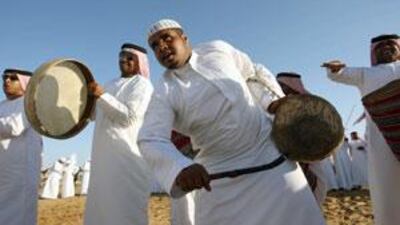Abu Dhabi // When asked what defines national identity, Emiratis offer a range of answers. They include the national dress, a connection with the desert, poetry, traditional dances, a sense of belonging, Islam and the Arabic language. Sheikh Zayed, the late president and founder of the UAE, is also invoked as a symbol of the nation and a central part of its identity.
But in some cases, people simply shrug and offer no answer at all. That there is no clear, common definition underscores the difficult task facing the Government as it attempts to halt what it sees as the erosion of Emirati culture and heritage. A sense of urgency has emerged in recent years, driven in part by the persistent decline in the percentage of Emiratis among a largely expatriate population.
Recently, the Cabinet issued a charter that stressed the need to uphold the country's traditions, including the use of Arabic, and urged Emiratis to have "large and cohesive families". Most experts and officials agree that the population imbalance, combined with the sweeping effects of globalisation, are the greatest contributors to the erosion of the nation's identity, social habits and language.
Only 13.3 per cent of the country's 7.55 million residents are Emiratis, down from 24.4 per cent in 1995. "You have a unique case of demographic imbalance, and that's the worst case anyone can have the threat of disappearing," said Dr Abdul Khaleq Abdullah, a professor of political science at UAE University. "It's an existential threat." To bring the imbalance under control, he suggested, the Government should rethink the decades-old pattern of development - double-digit annual growth that brings with it hundreds of thousands of foreign labourers.
"One to two per cent [growth] is more than enough for this country," Dr Abdullah said. "The material reward seems to be huge, but the social cost is much bigger." The impact of globalisation was reflected in a study last year conducted by students at the Communication and Media Sciences College at Zayed University. Their report concluded that young Emiratis were prone to losing aspects of their identity because they were easily influenced by the West.
Although 80 per cent of those surveyed said the Arabic language defines their identity, 53 per cent said they preferred to watch television shows in English. The students created posters for an on-campus campaign to promote the national identity. One included images of an Arab woman. The left side of her head was covered with a traditional scarf and her eye wide open, the right side was uncovered, her eye winking, as she listened to headphones.
Such influences from the West make younger people especially at risk of losing touch with their heritage, the Government believes. Two young Emirati men walking together at Al Wahda Mall recently were asked what national identity meant to them. One, who was 19 and did not want to be named, was dressed in a blue khandoura. He shrugged as he adjusted the earphones on his mobile phone. "I don't know," he said.
But his friend, Walid Rashid al Abdouli, 20, offered a definition. "Following customs and traditions, the national dress," said Mr al Abdouli, who was wearing a white khandoura and red-chequered headdress. "The Emirati loves his environment, the desert, and he's interested in hobbies related to it, such as falconry and camel races." The Government sees the loss of national identity and the population imbalance as serious issues - members of the Federal National Council (FNC) have called it a "threat to national security" - and has taken steps to combat the problem.
Sheikh Mohammed bin Rashid, the Vice President of the UAE and Ruler of Dubai, established a federal council on demographics last year to tackle the issue. Members of the FNC have lobbied for measures to rescue endangered components of the nation's identity, especially the Arabic language, and to control the influx of foreign workers. This month, the Cabinet strongly encouraged efforts to strengthen Emirati families. The charter released by the Cabinet advised that "marriage among Emiratis is a vibrant facet of our culture".
Scholars support the Government's belief that a strong identity is vital for the survival of any nation. Mohammed Yousef, the head of the UAE Journalists Association, offered a similar view. "Give me one example of a country that has abandoned its identity in the world," he said. "There is none. Everyone in the world preserves their identity. This is what makes societies different. We need to preserve our identity so we don't melt down."
Mr Yousef said some distinctly Emirati traditions were being revived. Television shows such as the Million's Poet, a traditional Bedouin poetry contest, and the Prince of Poets, a classical Arabic poetry contest, had renewed interest in poetry, which was an important part of the nation's cultural identity, said Mr Yousef. Poetry was an important part of life on the Arabian peninsula since pre-Islamic times.
At a recent wedding in Ras al Khaimah, Sheikh Mansour bin Zayed, the Deputy Prime Minister and Minister of Presidential Affairs, dedicated a poem that was recited through loudspeakers. Such occasions were reason for optimism, Mr Yousef said. "There is a forming, a re-launch among the young [of aspects of national identity]," he said. "We need to revive these components that are particular to our society."
mhabboush@thenational.ae

